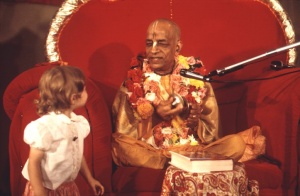750919 - Morning Walk - Vrndavana

A.C. Bhaktivedanta Swami Prabhupada
Prabhupāda:. . . prayateta kovida. Kovida means very intelligent person, not rascals, fools. Kovida, very expert. Kovida. Tasyaiva hetoḥ prayateta: "He should endeavor for that thing." What is that "that thing"? Na labhyate yad bhramatām upary adaḥ (SB 1.5.18): "Which is never happened to be achieved, although in different forms of life I have traveled in different planets, transmigration, but I could not get that." So in this human form of life, tasyaiva hetoḥ, which I did not get in so many lives . . . That means Kṛṣṇa. Tasyaiva hetoḥ prayateta kovido na labhyate yad bhramatām upary adaḥ (SB 1.5.18). Uparyadaḥ. Upari means higher planetary system; adaḥ, down planetary system. "Then? Simply I shall work for that purpose? Then what about my belly?" People are always . . . Whole world is embarrassed how to fulfill the belly. Eh? That economic question, this question, that question, philanthropism, this "ism," that "ism," the whole thing is centered round this belly. So one may question, "Then all things should be stopped?" Yes, all things will be stopped. Kṛṣṇa said, sarva-dharmān parityajya (BG 18.66). "Then the problem . . . How shall I eat? How shall I become happy?" So śāstra says, tal labhyate duḥkhavad anyataḥ sukhaṁ kalenā sarvatra gabhīra-raṁhasā. You are trying for getting happiness, satisfaction, but you do not try for distress. So why the distress comes?
Indian man: Automatically.
Prabhupāda: So if distress come automatically, then happiness also will come automatically. Why should you try for this so-called distress and happiness? You try for Kṛṣṇa. This is life. Just like the other day your liver fractured?
Indian man: Yes, sir, very badly.
Prabhupāda: So you did not want this.
Indian man: No.
Prabhupāda: So why did it . . . it happened?
Indian man: Kṛṣṇa is only that who is . . .
Prabhupāda: No, no, Kṛṣṇa is all right. Why it happened? You did not want it.
Indian man: No, I did not want it.
Prabhupāda: So similarly, the happiness which is destined to you, that will also happen, even though you do not want it. (break). . .rupees. Now I have got forty crores. Who has given me?
Indian man: Yes. Kṛṣṇa.
Prabhupāda: Kṛṣṇa has given me. So depend on Kṛṣṇa. He says, teṣāṁ nityābhiyuktānāṁ yoga-kṣemam (BG 9.22): "One who is engaged in My service, all that he wants, I supply." He says. See practically. Whatever we wanted, it is coming. It is coming not for my credit or another, anyone credit, Kṛṣṇa's credit, He is giving. As soon as He sees that "They are working for Me," He'll supply everything, whatever you need. Simply we must be sincere and spend it very cautiously, not squandering the money. Then He will give us everything. There is no need of surma(?)-making. I say it is nonsense that by surma-making I will be happy. Chant Hare Kṛṣṇa. Hare Kṛṣṇa. Tasyaiva hetoḥ prayateta kovidaḥ (SB 1.5.18). Only for advancing in Kṛṣṇa consciousness we should work. Then everything will come, whatever we want. That is called anyābhilāṣitā-śūnyaṁ (Brs. 1.1.11), without desiring for anything else. (break) " . . .in a rented house, there was no trouble. And as soon as this Devidatta gave us this marble palace, then there was competition who will occupy which room. In this way dissension began. So I am desiring that this dissension will increase and there will be fire. So to save this fire, I wish to get out all the marbles from this house and sell it and publish some books. That will remain." He said to me. Then I understood that he is giving more stress on books. "Sell the marbles and publish book instead of creating dissension amongst ourself." So, strictly, anyone occupies this guest room, he must pay. (end)
- 1975 - Morning Walks
- 1975 - Lectures and Conversations
- 1975 - Lectures, Conversations and Letters
- 1975-09 - Lectures, Conversations and Letters
- Morning Walks - India
- Morning Walks - India, Vrndavana
- Lectures, Conversations and Letters - India
- Lectures, Conversations and Letters - India, Vrndavana
- 1975 - New Audio - Released in May 2014
- Audio Files 05.01 to 10.00 Minutes